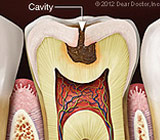 Think of a contagious disease and you may picture one of the great outbreaks of the past: the terrible flu epidemic of 1918, the ever-present threat of polio in the early 20th Century, and the ancient (and still widespread) danger of cholera in overcrowded urban areas. Or you may think of the common cold, a familiar contagious malady that’s still very much with us. Yet there’s one contagious disease you may not think of, but probably should: tooth decay.
Think of a contagious disease and you may picture one of the great outbreaks of the past: the terrible flu epidemic of 1918, the ever-present threat of polio in the early 20th Century, and the ancient (and still widespread) danger of cholera in overcrowded urban areas. Or you may think of the common cold, a familiar contagious malady that’s still very much with us. Yet there’s one contagious disease you may not think of, but probably should: tooth decay.
Many people don’t realize that tooth decay is contagious. But the fact is, decay bacteria can be passed between people like a bad cold — and it happens all the time.
Sugar usually gets the blame for tooth decay; a recent survey found that 81 percent of Americans say it’s responsible for cavities. But sugar alone isn’t the culprit. Cavities are actually caused by certain types of bacteria that cling to the teeth in the absence of proper oral hygiene. These bacteria process sugar from the foods we eat, and then secrete acidic byproducts that erode the hard enamel of the teeth. This causes the formation of the tiny holes we call cavities.
Children aren’t born with S. Mutans. But studies show that most of them “catch” it from their caregivers — often, their parents. By the time they are two years old, over 80 percent of kids will have detectable levels of the bacteria. Whether or not they pick up harmful microorganisms — and how much they have — depends on the infectiousness of the strain, and on the caregiver’s attention to oral hygiene.
How can you prevent the spread of decay-causing bacteria? Essentially, by limiting its transfer from your mouth to your baby’s mouth. So don’t “clean” a baby’s pacifier by putting it in your mouth, and don’t share utensils — for example, by tasting baby’s food with his or her spoon. While it’s ever so tempting, avoid kissing baby’s lips, especially if there is a chance of transferring saliva. And don’t even think of “pre-chewing” baby’s food — no matter what some self-appointed health gurus may say.
There’s still another way to limit the spread of decay-causing microorganisms: Make sure your own practice of oral hygiene is top-notch! Oral bacteria can spread not only from parents to babies, but also between adults. Maintaining good oral health means brushing and flossing every day, and getting regular check-ups: It’s important for you, and for everyone you care about.
If you have questions about tooth decay prevention or oral hygiene care, please contact us to schedule an appointment for a consultation. You can read more in the Dear Doctor magazine articles “Tooth Decay” and “How to Help Your Child Develop the Best Habits for Oral Health.”
